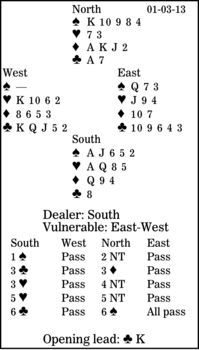Bridge column, January 3: If one is bad, cover the second

There are bridge deals where declarer is in danger only if two suits are lying unfavorably. But sometimes he has the opportunity to survive anyway.
How does that apply in this deal? South is in six spades. West leads the club king.
North's two-no-trump response showed four-plus spades and at least game-forcing high-card values. South's three-club rebid indicated a singleton or void in that suit. Three diamonds and three hearts were control-bids (cue-bids) promising first-round controls in those suits.
South has possible losers in each major. The heart finesse is apparently unavoidable. The trump suit is a danger only if it is breaking 3-0 -- and even then, declarer might avoid a loser.
The key point of the deal is that the trump suit isn't a guess. Declarer should cash dummy's spade king first. Here, West discards, so South draws trumps with the aid of a finesse and later tries the heart finesse for an overtrick.
What happens, though, if East discards under the spade king?
Declarer ruffs the club seven in his hand, cashes the spade ace, and turns to diamonds. If West never ruffs, South discards one heart, then plays a trump to West's queen. West is caught. He must either lead a heart into declarer's ace-queen or concede a ruff-and-sluff (when declarer pitches a heart from the board and ruffs in his hand). Either way, South has no heart loser.
** ** **
COPYRIGHT: 2013, UNITED FEATURE SYNDICATE
DISTRIBUTED BY UNIVERSAL UCLICK FOR UFS

